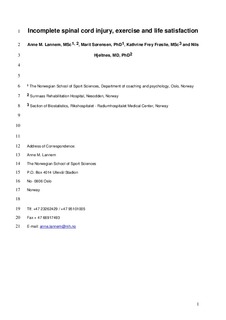| dc.contributor.author | Lannem, Anne Marie | |
| dc.contributor.author | Sørensen, Marit | |
| dc.contributor.author | Frøslie, Kathrine Frey | |
| dc.contributor.author | Hjeltnes, Nils | |
| dc.date.accessioned | 2009-09-18T07:46:00Z | |
| dc.date.issued | 2008-10-07 | |
| dc.identifier | Seksjon for coaching og psykologi / Department of Coaching and Psychology | |
| dc.identifier.citation | Spinal Cord. 2009, 47(4), 295-300 | en |
| dc.identifier.issn | 1362-4393 | |
| dc.identifier.uri | http://hdl.handle.net/11250/170519 | |
| dc.description | I Brage finner du siste tekst-versjon av artikkelen, og den kan inneholde ubetydelige forskjeller fra forlagets pdf-versjon. Forlagets pdf-versjon finner du på www.nature.com: http://dx.doi.org/10.1038/sc.2008.117 / In Brage you'll find the final text version of the article, and it may contain insignificant differences from the journal's pdf version. The definitive version is available at www.nature.com: http://dx.doi.org/10.1038/sc.2008.117 | en |
| dc.description.abstract | STUDY DESIGN: Cross-sectional survey. OBJECTIVE: This study investigates the role of physical exercise, perceived exercise mastery and fitness on life satisfaction of a sample of individuals with incomplete spinal cord injury (SCI). SETTING: Sunnaas Rehabilitation Hospital and the Norwegian School of Sport Sciences, Norway. METHODS: A questionnaire measuring life satisfaction, self-rated physical exercise and self-perceptions were mailed to persons with incomplete SCI. RESULTS: In total, 100 questionnaires were sent out and 69 respondents were included in the study. Of those, 68% performed physical activity regularly once or more a week. Participants who were exercising regularly once a week or more scored significantly higher on the summed life satisfaction scale (P=0.002) and on perceived fitness (P=0.004), but significantly lower on perceived exercise mastery (P=0.012) than those who were non-exercisers. CONCLUSION: Participants in this study with incomplete SCI who exercised regularly experienced a significantly higher life satisfaction and perceived exercise fitness, but lower perceived exercise mastery than their inactive peers. Perceived exercise fitness was the psychological variable that contributed meaningfully to life satisfaction in this study. | en |
| dc.format.extent | 74799 bytes | |
| dc.format.mimetype | application/pdf | |
| dc.language.iso | eng | en |
| dc.publisher | Nature Publishing Group | en |
| dc.subject | incomplete spinal cord injury | en |
| dc.subject | life satisfaction | en |
| dc.subject | physical exercise | en |
| dc.subject | self-concept | en |
| dc.title | Incomplete spinal cord injury, exercise and life satisfaction | en |
| dc.type | Peer reviewed | en |
| dc.type | Journal article | en |
| dc.subject.nsi | VDP::Medical disciplines: 700 | en |
| dc.source.pagenumber | 295-300 | en |
| dc.source.volume | 47 | en |
| dc.source.journal | Spinal Cord | en |
| dc.source.issue | 4 | en |
